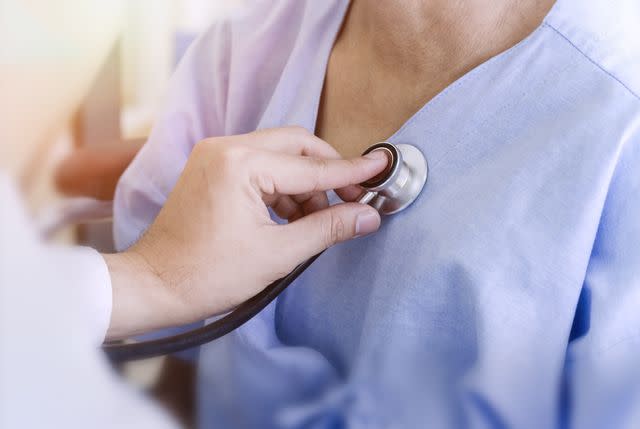Mom, 40, Had a Widowmaker Heart Attack — This Unusual Symptom Led to Her Diagnosis
“I just knew something was wrong,” the mother of two recalled while explaining the first symptoms of her massive heart attack

fstop123
Stock image of woman in doctor's office.Jessica Charron had suspected something was awry with her health before the doctors informed her she was suffering from a “widowmaker" massive heart attack.
Beginning in July 2022, Charron, who was 40 at the time, was experiencing chills and tingling that traveled from her head and neck down her back and arms, reports TODAY.com.
“It got very intense,” Charron told TODAY.com of the chills. “Something was wrong.”
“I just knew something was wrong,” she explained. “I felt like this is just not a normal chill — not even a flu-like chill. It was different. It was more intense.”
Related: Mom Assumed Her Night Sweats Were a Symptom of Menopause — But She Had Cancer
The mother of two then headed to the emergency room for some answers. However, after she underwent testing, she received inconclusive results and still had no answers.
“I looked at the ER doctor and teared up,” she explained, per TODAY.com. “I was adamant that (something was) wrong and I was so scared they were going to send me home.”
An emergency room doctor then told Charron that she wouldn’t be discharged until they figured out what she was suffering from. Although she wasn’t sent home, her symptoms began to worsen; and she noted for TODAY.com that she began getting physically sick and that the “discomfort was just unbearable.”
The later symptoms pushed the doctors to run another EKG, which concluded the 40-year-old woman was having a heart attack.
“I was young. I was healthy,” she said. “The biggest lesson learned for me is that heart disease doesn’t really discriminate.” (Charron's father suffered a fatal widowmaker heart attack months before her July 2020 symptoms. He died at 68, and like his daughter, he did not have earlier heart problems.)

Getty
Modern clean hospital ward stock imageShe then received a cardiac catheterization, which discovered that Charron had two small blockages and another 85% blockage in her left descending artery. A blockage in the left descending artery is often fatal if not immediately treated.
Charron was later treated with a stent in her artery, which relieved the obstruction and returned blood flow to normal. However, the doctors did not operate on the other blockages at the time due to possible risks and concerns.
Related: Woman Denied Mammogram at Age 30 Reveals Second Breast Cancer Diagnosis: 'Trying to Stay Positive'
A month later, she began to experience “some strange episodes,” believing they were heart-related. She returned to her cardiologist, who ran more EKGs and tests. This led to another heart catheterization, which discovered restenosis that caused a 95% blockage. According to the Cleveland Clinic, restenosis occurs after a patient’s artery becomes blocked after they receive a stent.
Five months after her initial symptoms, the mother of two underwent triple bypass surgery.
Since her 2020 bypass surgery, the mother of two has not suffered any additional heart problems. She continues to take her necessary medication and schedule appointments with her cardiologist.

Anchalee Phanmaha / Getty Images
Stock image of a doctor checking patient's heart with stethoscope at a hospitalNever miss a story — sign up for PEOPLE's free daily newsletter to stay up-to-date on the best of what PEOPLE has to offer, from celebrity news to compelling human interest stories.
Dr. Laura Mauri, the chief scientific, medical and regulatory officer at Medtronic, said that heart disease is the number one cause of death in women. “Not everybody experiences the same symptoms whether you’re a man or a woman,” Mauri told TODAY.com.
Dr. Mauri shared that people who suffer from chest pain or pressure, shortness of breath, pain in the neck, back, or arm, and excessive sweating should call 9-1-1.
She explained that the symptoms can be “life-threatening,” but EMS can provide early treatment that “actually saves lives” before a patient arrives at the emergency room.
“The good news is that in many cases if a heart attack is detected early the treatment can be pretty quick and not lead to a long hospitalization and lead to a full recovery,” added Dr. Mauri.
Charron is among the advocates for Her Fate, a "female heart recovery advocacy group" that seeks to raise awareness of heart disease in women.
For more People news, make sure to sign up for our newsletter!
Read the original article on People.


